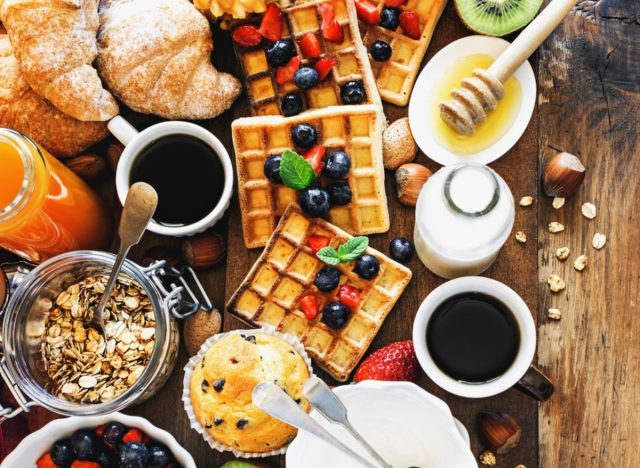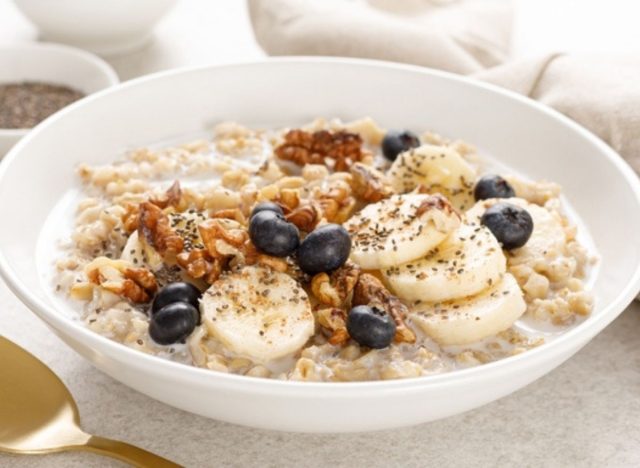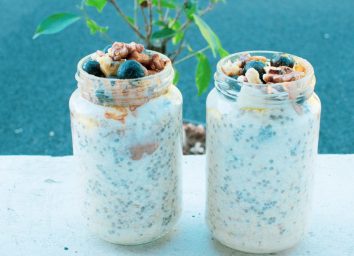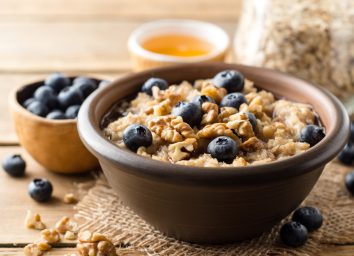The #1 Worst Breakfast Habit for High Blood Sugar, Say Dietitians

Before you reach for that sugary bowl of cereal or drown your pancakes in slippery syrup, think about how your body may not appreciate those choices to start off the day. Your eating habits are meant to fuel and guide your body's functionality, not cause more harm in the future.
That being said, if your breakfast meals don't accommodate your body's needs, then over time you have a good chance of developing major health conditions. Hyperglycemia—or consistent high blood glucose/sugar levels—is commonly characterized as prediabetes and can lead to many severe health complications (including diabetes).
According to our medical expert Lauren Manaker, MS, RDN, LD, CLEC, a registered dietitian and nutrition communications expert for Nutrition Now Counseling, in terms of high blood sugar, "one of the worst breakfast mistakes someone can make is skipping protein, fiber, and healthy fats."
Sugary breakfasts have a negative effect on blood sugar.

A lot of typical breakfasts are loaded with carbohydrates and high in refined sugars, and both of which cause extreme blood sugar spikes early on in the day, suggests Julie Upton, MS, RD, CSSD, another registered dietitian on our medical expert board.
"Foods that are sugar-rich or primarily low quality processed carbs are digested and absorbed quickly which causes blood sugar levels to rise rapidly," she explains. Sugary beverages are also the worst for raising blood sugar levels, Upton explains, "the sugar goes into the bloodstream really quickly and efficiently."
When your body breaks down sugar in foods, it's absorbed into the blood as glucose and highly increases the body's insulin. This can also cause blood sugar levels to remain high and not drop for hours after eating.
Inconsistent and high blood sugar levels can have effects on your body in the later years of life, not just your current every day.
"Poor eating habits long-term can decrease your body's ability to appropriately move glucose (blood sugar) from your bloodstream into your cells for energy," says medical expert Molly Hembree, MS, RD, LD, a retail dietitian coordinator for Kroger.
Skipping breakfast isn't a hopeful solution either, in fact, "going without that morning meal can increase blood sugar after both lunch and dinner," according to the CDC.
Eating too many carbs can also contribute to peaking blood sugar levels, but Upton points out, "if you eat carbs, make them whole grains or fruits and veggies."
Eat breakfasts rich in fiber and protein.

Including more foods with protein, fiber, and/or healthy fats will support a healthy postprandial (period after eating), as they are foods that stabilize the body's glucose and insulin when they are digested, The American Diabetes Association reported.
One way to fill in your missing breakfast components is to try "combining whole-grain carbs like whole-grain bread or oatmeal with foods like walnuts, which contain healthy fats, plant-based protein, and fiber," Manaker explains. Dietary fiber foods assist with managing your body's blood sugar by moderating how your body digests the food and breaks down glucose, according to the Mayo Clinic.
Enjoying more foods with more protein, lower amounts of added sugars, and a solid source of healthy fats can help you steer clear of sudden and quick blood sugar spikes, Upton says. Because protein helps slow digestion and keeps you full longer, it's a crucial element in controlling one's blood sugar from increasing right after eating.









